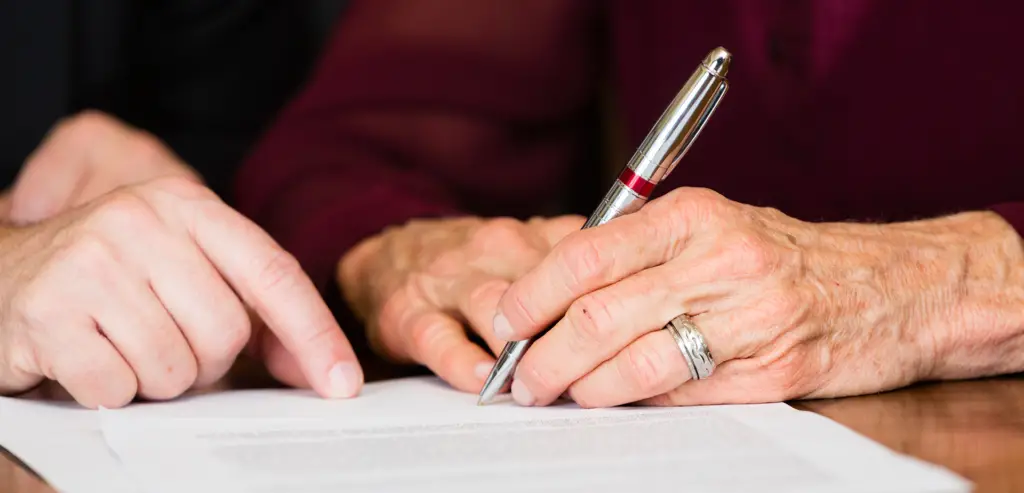While not traditionally commonplace, drafting a will in Singapore is gaining increased recognition as an insurant for the future. The surge in attention is attributed to the growing complexity of asset portfolios, extending beyond real estate to include stocks, bonds, cryptocurrencies, and collectibles. With a diverse range of assets, the need to ensure a seamless and fair distribution has become more apparent.
Nobody wants their departure to lead to disputes among loved ones over their possessions. If you’re considering creating your own will, you might be unsure about what to include and what belongings to leave behind.
Don’t worry, writing a will isn’t as complicated as it seems and there are a few step guides to look into for you to get started.
Requirements to make a Will in Singapore

Before you get all excited to write your legacy down, here are the requirements for a valid will in Singapore :
- The will must be committed to writing.
- The testator must be at least 21 years old.
- The testator must sign the will at the foot of the will.
- The testator’s signature must be witnessed by 2 or more witnesses, who must also sign the will in his presence.
- The 2 main witnesses cannot be beneficiaries of the will or spouses of beneficiaries.
Take note that in some instances, the testator may be incapacitated to sign their will. They cannot do so due to a medical condition or old age. In this case, the testator may allow another person to sign the will on their behalf, provided it is done in their presence. For anything you aren’t sure about, feel free to reach out to us or your lawyer for more information.
What Will Happen If You Don’t Write A Will Before You Die?

Dying without a will can have significant legal implications. When a person dies without a will, their assets are distributed according to the intestacy laws of Singapore. This means that the distribution may not align with the deceased’s wishes or the needs of their loved ones.
Without a will, the process of distributing assets can be prolonged. The court may need to appoint an administrator to handle the estate, which can cause delays and additional expenses. This could potentially lead to disputes among family members(costly battle) over the distribution of assets, which may strain relationships and result in costly legal battles.
Considering these consequences, it is crucial to have a will to ensure your assets are distributed according to your wishes and minimize potential conflicts among your loved ones. To avoid these challenges, here are the information that you need to consider:
- Create a comprehensive will that clearly outlines your wishes for asset distribution.
- Consult a professional will-writing service to ensure your will is legally valid and compliant.
- Regularly review and update your will to reflect any changes in your circumstances or wishes.
It’s hectic at first but this potential few hours of working on this could save your loved ones months of legal annoyance. But by taking these steps, you can provide your loved ones with clarity and peace of mind, knowing that your assets will be distributed according to your wishes and without unnecessary complications.
Why Is It Important To Write A Will?

When it comes to estate planning and asset distribution, expertise is crucial. A professional has the knowledge and experience to navigate the complexities of Singapore’s legal system and ensure that your assets are distributed according to your wishes. They can provide valuable advice on:
- Tax planning
- Minimizing potential disputes
- Maximizing the value of your estate
Additionally, a professional will writing service can help you make informed decisions about the distribution of your assets. They can assist in identifying potential beneficiaries, understanding the implications of different distribution options, and ensuring that your wishes are legally valid and enforceable.
Ensuring Legal Validity and Compliance
Using a professional will-writing service ensures that your will is legally valid and compliant with the laws and regulations in Singapore. This is important because a will that is not legally valid may be challenged or deemed invalid, leading to disputes and complications in the distribution of your assets.
By engaging a professional service, you can benefit from their expertise in navigating the legal requirements and ensuring that your will meets all necessary criteria. They are knowledgeable about the specific laws and regulations related to will writing in Singapore, including the formalities and procedures that must be followed.
Peace of Mind for You and Your Loved Ones
Having a professional will-writing service can provide you and your loved ones with the peace of mind knowing that your wishes will be carried out according to your instructions. By entrusting the task to experts in estate planning and asset distribution, you can ensure that your assets will be distributed most efficiently and fairly.
Additionally, using a professional service ensures that your will is legally valid and compliant with the relevant laws and regulations. This eliminates the risk of your will being deemed invalid or facing legal challenges in the future.
Furthermore, a professional will writing service can guide you through the entire process, making it easier for you to understand the complexities involved. They can provide valuable advice and assistance in making important decisions, such as appointing executors and guardians for your children.
Overall, utilizing a professional will writing service offers you and your loved ones the assurance that your final wishes will be respected and implemented, providing peace of mind during uncertain times.
What Asset to Include in a Will?

You can include most of your assets when writing a will(anything that you can put a price tag behind is worth something), but for a clearer image, we list the scope that must be part of your Schedule of Assets. The Schedule of Assets is used by the Court to ascertain the estate’s worth and calculate any additional application fees that must be paid.
You need to include your assets in this document even if you are not interested in distributing them. Assets go into one of two categories: personal property or real estate. Here are a few instances:
- HDB flat
- Private property (residential property or condominium unit)
- Share in a flat/property
- Your bank accounts’ monies (this includes fixed deposit accounts and unit trust accounts)
- Your shares and stocks
- Your insurance policies (you can only include your insurance policies as long as you have not transferred their ownership rights to someone else. Otherwise, you cannot include them)
- Your vehicles
- Your jewellery
- Items included in your safety deposit box (if any)
Your Central Provident Fund (CPF) funds do not need to be listed on the Schedule of Assets. You must submit a CPF nomination for your CPF funds to be disbursed. In the absence of a nomination, they will be divided by the Intestate Succession Act by the Public Trustee’s Office.
Other Things To Include In A Will
Now that you know which assets to put into your will, you must know the other prerequisites to include. With these specifics, the will becomes enforceable in court and becomes legally binding.
- Your liabilities – Your will must include instructions on how your debts must be paid before the assets are distributed amongst the beneficiaries.
- The beneficiaries – You must indicate the names of the beneficiaries to whom the assets will go. If the beneficiaries are not yet of legal age, make sure to indicate the guardians and how much they shall receive. In case the guardians pass away at the same time as you, you should also include a backup or reserve beneficiaries list.
- The executor – You must appoint an executor of the will. They protect your properties upon your death until all debts and taxes have been paid. The executor also sees that all other remaining assets are transferred to the rightful beneficiaries. Make sure your executor is someone you trust. Likewise, a beneficiary may also act as executor of the will.
- The advisors – Professional advisors who have assisted you in drafting the will, should also be included in it. For example, you may have hired a lawyer, financial adviser, or accountant to help with estate planning. Include their names and personal information as well.
- A revocation clause – A revocation clause is necessary to ensure the currently written will revoke any previous wills. When properly executed, the revocation clause ensures that the current document is the testator’s final testament.
- A residuary clause – A residuary clause passes down estate remainders to the beneficiaries identified in the will. It acts as a safety net for the distribution of all other items the deceased individual may own at the time of their passing. For example, if one of the beneficiaries unexpectedly passes away, the items previously distributed to them will become the remainder.
During this stage, it’s important not to rush the process, instead, you may want to focus and seek your lawyers, real estate agent, and financial advisor for their advice for each asset class to ensure a smoother transition for your loved ones.
Example of How to Draft Your Will

You can write your own will on a piece of paper, but it’s crucial to ensure that it meets the legal requirements of your jurisdiction. While a handwritten or “holographic” will be valid in some places, others have specific rules regarding the form and execution of a will.
Here’s a simple example of how you might write your own will on a piece of paper:
[Your Full Name]
I, [Your Full Name], [Your Address], [Your Date of Birth], being of sound mind and disposing memory, do hereby make, publish, and declare this to be my Last Will and Testament.
Appointment of Executor:
I appoint [Executor’s Full Name], [Executor’s Address], as the executor of this will. If [Executor’s Full Name] is unable or unwilling to act as my executor, I appoint [Alternative Executor’s Full Name], [Alternative Executor’s Address], as the alternative executor.
Distribution of Assets:
I give, devise, and bequeath all my real and personal property, including but not limited to [list specific assets], to the following beneficiaries:
- [Beneficiary 1’s Full Name], [Beneficiary 1’s Relationship], [Beneficiary 1’s Address]
- [Beneficiary 2’s Full Name], [Beneficiary 2’s Relationship], [Beneficiary 2’s Address]
Residue Clause:
I direct that any remaining assets not specifically bequeathed above shall be distributed equally among the aforementioned beneficiaries.
Guardian for Minor Children:
If I have minor children at the time of my death, I appoint [Guardian’s Full Name], [Guardian’s Relationship], [Guardian’s Address], as the guardian for my minor children. If [Guardian’s Full Name] is unable or unwilling to act as the guardian, I appoint [Alternative Guardian’s Full Name], [Alternative Guardian’s Relationship], [Alternative Guardian’s Address], as the alternative guardian.
Witnesses:
I declare that this will is my own handwriting, and I sign it on [Date]. I request the following persons to act as witnesses:
- [Witness 1’s Full Name], [Witness 1’s Address]
- [Witness 2’s Full Name], [Witness 2’s Address]
I declare that we, the testator and the witnesses, are all present together, and the witnesses are signing this will at my request and in my presence.
Signature:
[Your Full Name]
[Testator’s Signature]
Witnesses’ Signatures:
[Witness 1’s Signature]
[Witness 2’s Signature]
Please note that this is a basic example, and the legal requirements for a valid will can vary. It’s highly recommended to consult with a legal professional to ensure that your will is legally valid and complies with the specific laws in your jurisdiction.
Step 1: Gather Information
Before you start drafting your will, gather all the necessary information, including:
- Your full name, identification details, and contact information.
- Details of your assets, including property, bank accounts, investments, and personal belongings.
- Names and details of beneficiaries (those who will inherit your assets).
- Executor(s) – the person(s) responsible for administering your estate.
- Guardian(s) for minor children (if applicable).
Step 2: Decide on the Distribution of Assets
Determine how you want your assets to be distributed among your beneficiaries. Be specific and consider alternate arrangements in case a beneficiary predeceases you.
Step 3: Appoint an Executor
Choose a trustworthy and responsible person as your executor. This person will carry out the instructions in your will and ensure your wishes are fulfilled.
Step 4: Provide for Minor Children
If you have minor children, appoint a guardian who will take care of them in the event of your demise. Consider setting up a trust to manage their financial affairs until they reach a specified age.
Step 5: Write the Will
Begin drafting your will, either by using a will template or seeking legal advice. Include the following elements:
- Introduction: Start with your full name, identification details, and a statement revoking any previous wills.
- Appointment of Executor: Clearly state who will be responsible for executing your will.
- Distribution of Assets: Specify how your assets will be distributed among your beneficiaries.
- Specific Gifts: Be clear about any specific bequests or gifts to individuals or organizations.
- Residue Clause: Outline how any remaining assets will be distributed.
- Guardian for Minor Children: Clearly state who will take care of your minor children.
- Funeral and Burial Wishes: If you have specific wishes, include them in your will.
Step 6: Witnesses and Signatures
In Singapore, a will must be signed by the testator (person making the will) in the presence of at least two witnesses. The witnesses must also sign the will in the presence of the testator. The witnesses mustn’t be beneficiaries or related to beneficiaries.
Step 7: Keep the Will Safe
Once signed and witnessed, keep the original will in a safe and easily accessible place. Inform your executor of its location, and consider providing a copy to a trusted person or storing it with a legal professional.
Step 8: Review and Update
Regularly review and update your will to ensure it reflects any changes in your life, such as new assets, the birth of children, or changes in relationships.
Step 9: Consult with a Lawyer
While you can draft a will on your own, it’s advisable to consult with a lawyer to ensure that your will complies with Singaporean laws and is legally sound.
Navigating the Legal Landscape: Crafting Your Will in Singapore

Making a will saves your family a lot of money in the long term, even if it may not be a top priority right now. By dividing your estate properly in a will, your executor or guardian can prevent disputes amongst surviving family members over assets. Without understanding the criteria and other important information, the will-writing process can appear intimidating.
If you would like to be a service provider for your will, you can check out SingaporeFamilyLawyer to get started. They cater not just to will writing services, but also to many other cases such as Single-parent rights, bankruptcy cases, child abuse, uncontested diverse, and many others. Check out their website, link below:
Frequently Asked Questions
Why is having a will important?
Having a will ensures that your assets are distributed according to your wishes after your death. It provides clarity and avoids disputes among family members.
Can I write my own will without using a professional service?
While it is possible to write your own will, using a professional will-writing service ensures that your will is legally valid and complies with the relevant laws and regulations.
What happens if I die without a will?
If you die without a will, your assets will be distributed according to the intestacy laws in Singapore. This may not align with your wishes and can lead to complications and disputes among your loved ones.
How can a professional will writing service help with estate planning?
A professional will writing service has expertise in estate planning and can assist you in structuring your assets and planning for their distribution. They can provide valuable advice and guidance based on your specific circumstances.
How do I choose a reliable will writing service in Singapore?
When choosing a will writing service, consider their experience, reputation, and credentials. Look for reviews and recommendations from trusted sources, and ensure that they have a clear and transparent process for drafting and executing wills.
Can I make changes to my will after it is written?
Yes, you can make changes to your will after it is written. It is recommended to review and update your will periodically, especially after major life events such as marriage, divorce, birth of children, or acquisition of significant assets.
Is it mandatory to hire a lawyer to create a will in Singapore?
While it’s not mandatory, consulting a lawyer ensures that you will comply with Singaporean laws, minimizing the risk of legal complications.
Can I include my digital assets in my will?
Yes, you can. Including instructions for your digital assets ensures a smooth transition and prevents potential loss.
How often should I update my will?
Regularly review your will, especially after significant life events such as marriage, the birth of children, or the acquisition of substantial assets.
What happens if I die without a will in Singapore?
In such cases, Singaporean intestacy laws determine the distribution of your assets, which may not align with your wishes.
Can I appoint more than one executor for my will?
Yes, it’s possible to appoint multiple executors. Ensure they can work together harmoniously and understand their responsibilities.
Are joint wills legally binding in Singapore?
Yes, joint wills are legally binding, but they require mutual consent. It’s crucial to understand the implications before opting for this arrangement.
How Much Does It Cost To Make A Will In Singapore?
The cost of writing a will in Singapore will vary from lawyer to lawyer. Generally, the cost ranges anywhere from $200 up to $400.
Will A Divorce Revoke A Will In Singapore?
Yes, in Singapore, a divorce can have a significant impact on a will. According to the Wills Act, if you have made a will during your marriage and subsequently undergo a divorce, the parts of the will that concern your former spouse may be revoked. This revocation is automatic, and the law treats your former spouse as if they had passed away before you.
It’s crucial to review and update your will after a divorce to ensure that it aligns with your current wishes and circumstances. Failing to do so may lead to unintended consequences and complications in the distribution of your assets. Seeking legal advice to navigate these changes and make necessary adjustments to your will is advisable to ensure that your testamentary intentions are accurately reflected and legally binding.
Do You Need A Solicitor To Draw Up A Will?
While it is not mandatory to hire a solicitor to draw up a will, seeking the assistance of a legal professional is highly recommended in many cases. A solicitor can help you navigate complex legal language, address specific requirements, and ensure that your will accurately reflects your wishes. They can also offer advice on potential challenges or issues that may arise, providing you with peace of mind regarding the legality and effectiveness of your will.





